Tom Kepler's Blog, page 36
January 10, 2012
Book Review: Through Kestrel's Eyes, by Yvonne Hertzberger
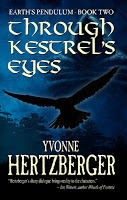 Through Kestrel's Eyes
continues the Earth's Pendulum fantasy series of novels by Yvonne Hertzberger. The first in the series is
Back from Chaos
.
Through Kestrel's Eyes
continues the Earth's Pendulum fantasy series of novels by Yvonne Hertzberger. The first in the series is
Back from Chaos
.The saga continues, told from the first person narrative of Liannis, a woman seer who is connected with the Earth Mother.
"Liannis, the goddess Earth's seer, her apprenticeship interrupted by the death of her mentor, must help restore the Balance. Until it is, Earth's power is weakened, preventing Earth from sustaining the rains needed for good harvests. Drought and famine result."Like the first novel of the series, I found this to be a quick read. The events impact the rise and fall of kingdoms: coup d'etat, abuse of the populace, drought, famine, and plague. Discovering how all this balances out is what turns the pages, for activities that do not support nature weaken natural forces so that imbalances occur. For the seer Liannis, helping restore that balance is her life's task.
One tag given to this novel is "fantasy romance," and I feel that is accurate. Along with the civilization-affecting challenges of the novel are also the individual characters and their quest for happiness. The author Hertzberger focuses on women in this novel, and although this was in many ways illuminating for me, a male reader, I found myself lacking a character I truly identified with.
Liannis is the main character, yet because of her role as speaker for Earth, her characterization becomes elevated beyond the human in many ways. What balances this is the seer's relationship with her servant Merrist, a soldier who loses a leg in battle and who then must revise his concept of self and role in life. Merrist was actually the character I connected to most.
As a romantic fantasy, the novel's individual characterizations revolve around love: the love relationships between the adults in the novel (from book 1 of the trilogy), a young prince and princess, and the hints of forbidden love between Liannis and Merrist. These are compelling characterizations but not completely fulfilling for me. I suppose I found the social and political conflicts more compelling.
Other areas that moved the novel to "romance fantasy" and more for women readers were the following: a beautiful woman who courted power by flirting with two princes; a neglected and abused mother who fears her husband; a pig of a rapist who takes advantage of the political chaos; women abused by the political leaders; the healing and nursing necessary after revolution; and a wedding with a very important dress. These conflicts and events were, in many ways, the story. They make the story but also skew the story, in my opinion. Thank God for Merrist and his rehabilitation.
However, I did read this book quickly and did not want to put it down. As in the first book, I wanted to find out what happened next. I wanted to find Earth placed back in balance. Hertzberger does an excellent job of including the individual stories within the epic events of the series. The magic of Liannis is realistic within the context of the novel. She has visions sent from Mother Earth, and she relays the information to the significant leaders. This works quite well.
The perspective of this novel, though, is more a woman's. If you greatly enjoyed England's marriage of Prince William and Kate Middleton (and I watched along with my wife), then you will find corresponding events in this novel: save your kingdom and find love. I considered giving this novel a "3-star" rating, but decided that my personal bias shouldn't color my evaluation. It's actually a technically more proficient novel than the first in the series and deserves an equal "4-star" rating.
Thinking about some hints delivered in the novel, I'm wondering where the third novel of the trilogy will take us. That's an excellent sign.
Copyright 2012 by Thomas L. Kepler, all rights reserved
Published on January 10, 2012 05:00
January 7, 2012
Getting Ideas for Writing (with a focus on the 6-Traits + 1 writing strategies)
 Having an idea is always the first stage of writing something.
Having an idea is always the first stage of writing something. Writers approach getting a good idea in diverse ways. In Writing Down the Bones: Freeing the Writer Within , Natalie Goldberg suggests buying a notebook and just filling it--top to bottom, edge to edge--and with the volume of words, ideas will finally coalesce into a project or projects. Others suggest jotting notes as good ideas come. This is what I do; then, of course, I have to keep track of the notes! Brainstorming (a rather scary term, if you ask me) is recommended by others--a sort of blend of writing freely without focus and jotting.
Once an idea or project is selected, then supporting ideas must be developed. For me, this is a very organic and fluid experience. I feel the story inside me in its wholeness, don't focus too much on the specifics, and then when I sit to write, the specifics and details just open up. It's not that I start without an idea; it's more that I know what's inside the box, so I don't feel the need to make a detailed inventory prior to using the contents. However, in all fairness, I do sometimes jot down notes for an entire passage, a sort of informal outline. I did that for the "Gnome's Quest" chapters of The Stone Dragon , which were added to the second draft of the novel. A recent short story set in the Dragons of Blood and Stone series, "Cobb's Dragon," was informally outlined prior to writing the 2,500-word story.
People have different learning styles or "intelligences," so it is important to gain familiarity with what works for you. Once you find your style of working, then successfully using that style or those strategies should add to your confidence and competency as a writer.
The Six Tra
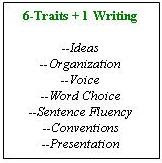 its program says that ideas should be clear, focused, hold the reader's attention, relevant, accurate, written from knowledge or experience, and should consider the reader and be insightful.
its program says that ideas should be clear, focused, hold the reader's attention, relevant, accurate, written from knowledge or experience, and should consider the reader and be insightful.Ranier Maria Rilke, from his Letters to a Young Poet , said that everything we write on paper comes from within us. Our first step as a writer is to contact that source of ideas within us. After that we must put those words on paper as elegantly as we possibly can.
Although good ideas can come at any time, I think it's a good idea to give ourselves a break. We should take care of ourselves as best we can--be rested, healthy, and unstressed. I practice the Transcendental Meditation program. That helps. I also take regular breaks when I write and bike ride, work in the garden, chop firewood, wash the dishes--engage in some physical activity.
Not being fatigued or frazzled, then when idea bubbles to the surface, it's not lost in the froth created by 10,000 monkeys beating the water with sticks.
Another thing I believe is that we should write regularly. We can get into a habit of using our creativity if we regularly engage in creative pursuits. A sort of channel is formed that allows our creativity to flow more easily. In sports, the term momentum is used; being on a roll is a good thing. In addition a dull piece of writing can be revised, but a blank piece of paper is just there, austere and intimidating.
 Writer's block isn't something I experience often, if at all. It does remind me, though, of that story regarding American pioneer Daniel Boone (of which there are several versions). Asked if he had ever been lost, Boone said, "I've never been lost, but once I was a mite confused for a few weeks." I can always write, but there are times the writing seems flat. I keep on writing, having confidence from experience that all will work out in the end.
Writer's block isn't something I experience often, if at all. It does remind me, though, of that story regarding American pioneer Daniel Boone (of which there are several versions). Asked if he had ever been lost, Boone said, "I've never been lost, but once I was a mite confused for a few weeks." I can always write, but there are times the writing seems flat. I keep on writing, having confidence from experience that all will work out in the end.The most straightforward definition of a writer, after all, is one who writes. Everything after that is the cream on the peaches.
"Having created the creation, the Creator—Cosmic Creative Intelligence—entered into it." Taittiriya Upanishad 2.6.1"Perhaps it will turn out that you are called to be an artist. Then take that destiny upon yourself and bear it, its burden and its greatness, without ever asking what recompense might come from the outside. For the creator must be a world for himself and find everything in himself and in Nature to whom he has attached himself." Rainer Maria Rilke
When we write, we are engaging in the same process that created the universe--same process, different scale. I think that is why making stuff up--or figuring stuff out--is such a powerful experience. When we create, we touch the divine.
Samuel Johnson wrote: "No man but a blockhead ever wrote, except for money." Johnson made a living from his writing--but he wouldn't have accomplished that if his writing, publishing, and marketing ideas hadn't been innovative and in touch with the creative imagination of his time.
Get the idea?
Copyright 2012 by Thomas L. Kepler
Published on January 07, 2012 17:17
January 5, 2012
Reader's Bill of Rights
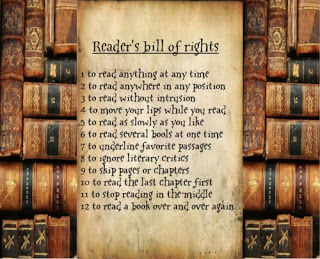 The following guest post is from blogger extraordinaire Jessica at Hopelessly Devoted Bibliophile. Power to the reader! I've seen this poster around more than a few times lately, and I still remember the first time I ever saw it. In 4th grade, this was posted in our library at school. We had the coolest librarian, and she was the first one who really sparked my love of eclectic reading. Now that it's a new year, I'm taking a look back into my past as a reader. These simple little sentences are still as important to me now as they were back then. So I thought I'd share them with you, and give you a little of my outlook on each.
The following guest post is from blogger extraordinaire Jessica at Hopelessly Devoted Bibliophile. Power to the reader! I've seen this poster around more than a few times lately, and I still remember the first time I ever saw it. In 4th grade, this was posted in our library at school. We had the coolest librarian, and she was the first one who really sparked my love of eclectic reading. Now that it's a new year, I'm taking a look back into my past as a reader. These simple little sentences are still as important to me now as they were back then. So I thought I'd share them with you, and give you a little of my outlook on each. 1) To read anything at any time.So there you have it! Do you follow any of these? If this is your first time seeing this awesome set of reader's rights, steal away! It isn't mine to hold onto anyway. I found it through an amazing librarian, and I pass it on whenever possible.
See this people who shop at Walmart at the same time as me? It is perfectly normal for me to pull a paperback out of my purse while shopping. Shopping and reading. Perfect combination!
2) To read anywhere, in any position.
So what if I want to read upside down on the couch? Perhaps the blood rushing to my head helps comprehension. (No really, I do this.)
3) To read without intrusion.
There is a reason why I hide in the bedroom at a particularly good part in my book. All that's missing is a DO NOT DISTURB sign on the door.
4) To move your lips while you read.
I don't personally do this, but I totally laugh out loud sometimes. This doesn't work well when you're reading on the bus.
5) To read as slowly as you like.
Honestly, it will take me weeks to get through some books. That is why I like number 6...
6) To read several books at one time.
If a book looses my interest for a bit, I start a new one and come back. I often read 5 or 6 books at the same time. I admit it.
7) To underline favorite passages.
This is one thing I don't do, but I'm OCD about my books. All of them (even ones I've had for years) still look brand new.
8) To ignore literary critics.
You may not love a book, but I will. I may totally dislike a book that you praise. Live and let live.
9) To skip pages or chapters.
I admit it. I've skipped all the way to the middle of a book, just to see if it got any more interesting. If I'm investing my reading time, I want something to happen!
10) To read the last chapter first.
Guilty. Especially in books that I am not sure about reading yet.
11) To stop reading in the middle.
Heck. To stop reading 50 pages in! If the book isn't enticing me, I move on to something new. Too many books, too little time.
12) To read a book over and over again.
The Goose Girl, Stargirl, The Tale of Desperaux. All these are books I've read at least 3 or 4 times each. If you fall in love, it's okay to stay in love.
Happy reading!
Thank you, Jessica. I would add one more: "To buy an extension cord so my e-reader won't conk out when I'm on the last chapter!
All copyrights reserved for the author.
Published on January 05, 2012 19:08
January 3, 2012
Book Review: The Adventures of Huckleberry Finn
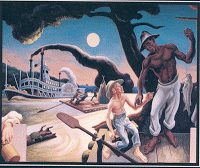 I'm glad I re-read The Adventures of Huckleberry Finn. I was motivated by the hubbub of last year when a bowdlerized version of the novel was published, taking out the "n-word." In fact, I was motivated to not only read Twain's version but to teach it.
I'm glad I re-read The Adventures of Huckleberry Finn. I was motivated by the hubbub of last year when a bowdlerized version of the novel was published, taking out the "n-word." In fact, I was motivated to not only read Twain's version but to teach it.Goodreads lists 495,491 ratings and 5,327 reviews for The Adventures of Huckleberry Finn:
5 stars: 28%4 stars: 32%3 stars: 27%2 stars: 8%1 star: 3%I'm not going to try to break new ground; over 5,000 reviews have already covered quite a lot. I do have a few personal reactions that I'd like to share, having re-read the novel after a many-years gap between readings.
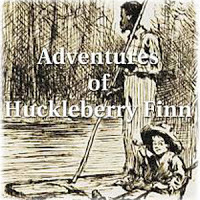 The river was a huge presence for me in this reading. Twain's outlandish characters came and went, but the river flowed on and on, the embodiment of nature, the source of all.The first part of the book establishes Huck and Jim's relationship. The rest of the book contrasts and challenges that relationship with the inequities of society.Jim is a noble character in the novel; he is noble even in his moments of laughable ignorance. Other characters are foils to his nobility.Huck rises above his background--and falls below our expectations. He is great in his promise and potential to transcend the limitations of his upbringing and the consciousness of his times. He is our hope and exasperation.Twain is wickedly realistic with the ending of the story. It's no surprise that Huck is lighting out for the Territories before someone "sivilizes" him. Who needs civilization like that?If you want to choose one review of The Adventures of Huckleberry Finn out of the thousands, choose this one by Norman Mailer for The New York Times: "Huckleberry Finn, Alive at 100." By the way, Huck Finn is available from many sources as a free ebook; Project Gutenberg is one source.
The river was a huge presence for me in this reading. Twain's outlandish characters came and went, but the river flowed on and on, the embodiment of nature, the source of all.The first part of the book establishes Huck and Jim's relationship. The rest of the book contrasts and challenges that relationship with the inequities of society.Jim is a noble character in the novel; he is noble even in his moments of laughable ignorance. Other characters are foils to his nobility.Huck rises above his background--and falls below our expectations. He is great in his promise and potential to transcend the limitations of his upbringing and the consciousness of his times. He is our hope and exasperation.Twain is wickedly realistic with the ending of the story. It's no surprise that Huck is lighting out for the Territories before someone "sivilizes" him. Who needs civilization like that?If you want to choose one review of The Adventures of Huckleberry Finn out of the thousands, choose this one by Norman Mailer for The New York Times: "Huckleberry Finn, Alive at 100." By the way, Huck Finn is available from many sources as a free ebook; Project Gutenberg is one source.Copyright 2012 by Thomas L. Kepler, all rights reserved
Published on January 03, 2012 05:00
December 31, 2011
Three Short Stories in Two Weeks: a wonderful way to end the year
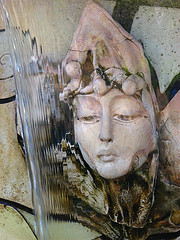 The Dragons of Blood and Stone fantasy universe began with the novel The Stone Dragon, which was published this year, 2011.
The Dragons of Blood and Stone fantasy universe began with the novel The Stone Dragon, which was published this year, 2011. The sequel to The Stone Dragon is Dragons of Blood and Stone, awaiting the revising process. It was a great gift and surprise to me, though, that in the last two weeks I have finished the rough drafts of three short stories and have also had a chance to engage in multiple revisions of two of the stories. These three stories are set in the DBS universe.
What a wonderful way to end the year!
The first short story, set in il-Barat and the desert north of that village, is 8,500 words. (This is literally off the map of the DSB universe--to the southeast of the Sand Barrens.) Entitled "Who Listened to Dragons," I started with the idea of listening as a magical talent, to listen or attend so well that possibilities emerged from a situation that were so striking and extraordinary that they seemed . . . well, magical. I added to the drama of the story by making one of the two main characters a six-year-old autistic child--the "listener."The second short story, 2,500 words long, is entitled "River's Daughter." It takes place on the Makepeace River and involves a water elemental. The challenge I set for myself was to create a dramatic story about a water elemental (or naiad), and how this embodiment of the laws of nature interacts with humanity yet is totally unattached to humanity--totally inhuman, one might say. I wanted the spirit to be totally good and giving, as nature can be, and equally totally deadly and dangerous, as nature can be. Two sisters who live by the river are the main characters. The forces of nature can be scary, and I tried to include that in this story.I wrote the third story, "Cobb's Dragon," with a kinder, gentler ending. At 2,500 words, it is the story of--you guessed it--Cobb, a cobbler's son. The story takes place past Outland in the passes of the Eagle Cap mountains, above the timberline, between two lands--the Empire and the Freelands. The main conflict is that Cobb doesn't want to be a cobbler. His discovery is that one can be many things--some prosaic and some fantastic. I've been thinking about Cobb for several years, really. He will have a place when the Dragons of Blood and Stone series moves east from the Freelands to the Empire.Who knows? Maybe on January 1, 2012, I'll zip off another short story draft. I'd like to write the story of Tucker and Tucker, two identical twins who are introduced in The Stone Dragon. I'd like to explain how it came to be that they are so strange--identical twins who have established two inns, each on the opposite sides of a small river out in the wilderness. Why is it there is so much competition between the two? There is a magical tale regarding Tucker and Tucker, more than just a comic situation.
I've had a wonderful end to 2011 and will let you know when the short stories are available. I will make them available as e-stories--and at least two of them will be for free. The best of all success and happiness to all in 2012! It looks like I'll be busy, and that makes me happy.
Copyright 2011 by Thomas L. Kepler, all rights reserved Image copyright 2006 by Holly Smith, Flicker
Published on December 31, 2011 17:27
December 29, 2011
Underground Book Reviews interviews me about The Stone Dragon
 Underground Book Reviews was kind enough to interview me about my fantasy novel, The Stone Dragon, and the journey of its writing.
Underground Book Reviews was kind enough to interview me about my fantasy novel, The Stone Dragon, and the journey of its writing. Here are the interview questions below. If any catch your curiosity, then follow the interview link.
Interview with Tom Kepler by Katie French
The world your novel inhabits in is very lush and inviting. Where do you draw your inspiration from when you are world building? Any advice for those wanting to improve their fantasy world building? Tell us more about Glimmer, the main character. Where did he originate from? What did you do to get into a young dream mage's head? One of my favorite characters is Cabbage-pants, the cabbage gnome. He is funny, wise and charming. How do you keep characters original when so many of the fantasy characters have been done before? Who are your contemporaries in literature? To which authors would you compare your work? Tell us about your path to self-publishing. What made you decide on that route versus traipsing around to all the publishers in New York? How much marketing do you focus on when trying to promote a book? What types of efforts have been most helpful? Tell us more about consciousness-based writing. Where did you learn the technique? How do you employ it? I see you are also a poet. Which genre is your favorite? Do you employ techniques in fiction writing that you've learned from poetry? On your blog www.tomkeplerswritingblog.com you mention you are an educator. How do you balance your day job and still find time to write? One of your reviewers mentioned a sequel. What do we have to look forward to in the next installment of The Stone Dragon series?If you have any questions about the writing of the novel, be sure to ask!
Published on December 29, 2011 09:01
December 27, 2011
Book Review: Archangel, by Sharon Shinn
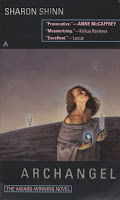 "From the acclaimed author of The Shape-Changer's Wife comes a stunningly beautiful novel of a distant future--where the fate of the world rests in the voice of an angel. An age of corruption has come to the planet of Samaria, threatening that peace and placing the Samaritans in grave danger. Their only hope lies in the crowning of a new Archangel." (Goodreads preview)
"From the acclaimed author of The Shape-Changer's Wife comes a stunningly beautiful novel of a distant future--where the fate of the world rests in the voice of an angel. An age of corruption has come to the planet of Samaria, threatening that peace and placing the Samaritans in grave danger. Their only hope lies in the crowning of a new Archangel." (Goodreads preview)Angels have wings, live in eyries, and sing so beautifully that God listens. God rains down manna from heaven, changes weather when angels fly to the clouds and sing forth their prayers. God's priests stare at lit screens and the strange symbols that appear there. Once, one was lifted bodily to heaven, came back with strange stories, and was branded a heretic.In Archangel , Sharon Shinn compliments the reader by explaining the science fictional reality as little as possible. But what a richness comes from those little nuggets of backstory that are a rare and precious part of this novel!
The storyline is a love story: Archangel Gabriel loves the human woman Rachel. This is true because God has decreed it. That Gabriel is an angel who is all God's business and Rachel is a woman who independently seeks acts of love rather than acts of faith creates a tension that elevates religious/political conflicts to the universal values of love and commitment.
"It is his destiny and hers. And Gabriel is certain that she will greet the news of her betrothal with enthusiasm, and a devotion to duty equal to his own. Rachael, however, has other ideas . . ."Shinn creates main characters who are flawed yet able to seek that which is greater. It is a human journey: helter-skelter, reckless, and lacking a master plan. That harmony prevails is perhaps a sign that Jehovah is more than a spaceship orbiting the planet Samaria.
First published in 1997, this novel is one that transcends the current fads of the market. It is a novel that transcends the genre, equal to Ursula LeGuin's The Dispossessed .
Copyright 2011 by Thomas L. Kepler, all rights reserved
Published on December 27, 2011 05:00
December 24, 2011
How to Run a Goodreads Giveaway: what I learned from running one (Part 2)
 Goodreads is a reader/writer website for sharing information about published books: reviews are the centerpiece of the site that also includes forums, discussion groups, author profiles, lists, and contests.
Goodreads is a reader/writer website for sharing information about published books: reviews are the centerpiece of the site that also includes forums, discussion groups, author profiles, lists, and contests. In the first part of this focus on Goodreads giveaways, I covered my general experiences and also two links: one to an interview of GR giveaways Community Manager Patrick Brown and one for a blogger who listed the step-by-step instructions of how to set up a giveaway.
This second article on Goodread giveaways will focus on some finer points regarding the giveaways, specifically scheduling and etiquette. After reading the GR help section for the topic of "giveaways," and after several email exchanges with the GR giveaways community manager and with author/publishers who have used the program, here are the results of my research.
1. Does a book have to be newly published to be eligible for a giveaway at Goodreads?
From the giveaway "help" section: While most books in the giveaway program are new releases or haven't yet been released, we don't have a rule against books that were published in previous years. Feel free to do so! Just remember to leave the "release date" field blank or type in "January 1, 2011" as a placeholder. (The date may change to January 1, 2012 with the new year, according to the GMCM.)2. Can a book be in a giveaway more than one time?
From the giveaway "help" section: Yes, you can list a giveaway for a certain title as many times as you like, as long as the giveaway dates don't overlap. One must end before the next starts.3. GR Community Manager Patrick Brown added in an email to me the following comment regarding multiple giveaways:
"Yes, a second giveaway is possible, and actually, I encourage it. Time your second giveaway to correspond with the publication date, and you should get a nice bump in awareness. In theory, there's no limit on how many giveaways you can run (as long as they are not running concurrently). In practice, I think two is ideal -- one pre-publication and another at publication."4. Can you contact individuals who signed up for the giveaway?
Regarding winners (from contest Terms and Conditions): You agree to not store the winners' mailing addresses and to never mail anything to the winners except the indicated book. Regarding individuals who entered the giveaway, listed on the giveaway page as "Current Entries" (from giveaways community manager email to me): "In general, we don't advise contacting people who haven't already contacted you. While you might think that entering a giveaway is sufficiently expressing interest in the book to hear about future giveaways, discounts, etc., we've found that this isn't the case. Some people will be interested enough in a book to enter to win it for free, but not interested enough to engage in any kind of dialog with the author (That might change after they read the book). These people are likely to flag you as a spammer if you message them, so we discourage it. Again, this doesn't apply to people who have reached out to you by friend request or message, etc." Regarding individuals who entered the contest and also placed the book on their "to read" list (listed as "To Be Read" at the bottom of the book's page): I think the above comment relates to this, also. Be careful not to spam our innocent readers. However, one author used that list to send a short, conversational email to individuals, providing a link to the book for a free online version. She added that she could also have used a free coupon from Smashwords instead of a link to the online version. She received many positive comments and no negative remarks. However, she was offering an ebook version to someone who had already indicated the desire for a paper version of the book.5. What is a risk-free way to use information gained from the contest about readers?
In my opinion, an absolute risk-free procedure is to simply research the individuals who have expressed an interest in your book--especially those who put it on their to-read list. Perhaps they are bloggers who review books--many are. Have they reviewed books like yours? What is their blog's policy for review submissions? What links do they have that are useful? This is information that is available to anyone on the internet--that's why people have webpages! Narrowing Goodreads' subscribers from 6.6 million to hundreds is quite a useful, time-effective action.Goodreads is a massive site, and I have to admit I am just gaining some familiarity with it. My questions have been answered promptly and politely by various administrators, and I have felt comfortable asking those questions. The process has been friendly yet professional.
I think that's the key: When setting up a Goodreads giveaway (or interacting with any other part of the site), we should be professional and discriminative. We should use the site, not abuse it.
Copyright 2011 by Thomas L. Kepler, all rights reserved
Published on December 24, 2011 07:30
December 23, 2011
Book Giveaway: The Stone Dragon
 Three copies of The Stone Dragon will be given away in this contest. So far, over 175 readers have the fantasy novel on their "to read" list at Goodreads.
Three copies of The Stone Dragon will be given away in this contest. So far, over 175 readers have the fantasy novel on their "to read" list at Goodreads. "Tom Kepler uses Glimmer's story to examine the nature of magic, of power, of consciousness, of the grand adventure of becoming."
--Shawn MacKenzie, Amazon review
"The author makes the point that magic is everywhere, in us, and around us, and at the core of everything . . . The dragons, of course, steal the show." --Pauline Ross, Goodreads review
.goodreadsGiveawayWidget { color: #555; font-family: georgia, serif; font-weight: normal; text-align: left; font-size: 14px; font-style: normal; background: white; } .goodreadsGiveawayWidget img { padding: 0 !important; margin: 0 !important; } .goodreadsGiveawayWidget a { padding: 0 !important; margin: 0; color: #660; text-decoration: none; } .goodreadsGiveawayWidget a:visted { color: #660; text-decoration: none; } .goodreadsGiveawayWidget a:hover { color: #660; text-decoration: underline !important; } .goodreadsGiveawayWidget p { margin: 0 0 .5em !important; padding: 0; } .goodreadsGiveawayWidgetEnterLink { display: block; width: 150px; margin: 10px auto 0 !important; padding: 0px 5px !important; text-align: center; line-height: 1.8em; color: #222; font-size: 14px; font-weight: bold; border: 1px solid #6A6454; -moz-border-radius: 5px; -webkit-border-radius: 5px; font-family:arial,verdana,helvetica,sans-serif; background-image:url(http://goodreads.com/images/layout/gr... background-repeat: repeat-x; background-color:#BBB596; outline: 0; white-space: nowrap; } .goodreadsGiveawayWidgetEnterLink:hover { background-image:url(http://goodreads.com/images/layout/gr... color: black; text-decoration: none; cursor: pointer; }
Goodreads Book Giveaway
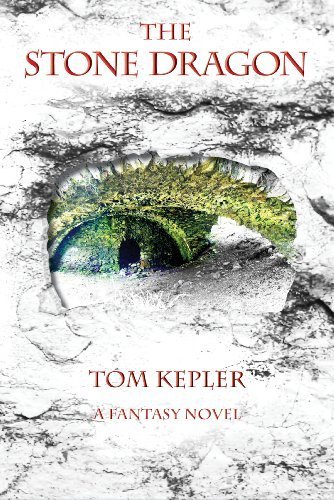
The Stone Dragon
by Tom Kepler
Giveaway ends January 18, 2012.
See the giveaway details
at Goodreads.
Enter to win
Published on December 23, 2011 08:18
December 22, 2011
Oprah Winfrey Discusses Her Experience with Transcendental Meditation
When Oprah Winfrey came to Fairfield, Iowa, and to Maharishi School, where I teach, I was on security duty and never saw her.
Of course, I felt completely fulfilled, knowing that her security was assured.
I was pleased when this video below was posted on YouTube because I could hear her talk about Transcendental Meditation and the town where I live.

Of course, I felt completely fulfilled, knowing that her security was assured.
I was pleased when this video below was posted on YouTube because I could hear her talk about Transcendental Meditation and the town where I live.
Published on December 22, 2011 05:00



